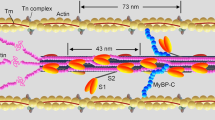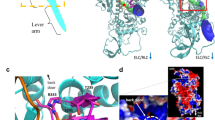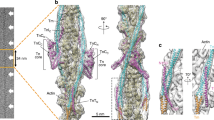Abstract
In the myosin-linked regulatory mechanism typified by the molluscan scallop adductor muscle, contraction is controlled by Ca2+ binding to sites on the thick filament protein, myosin1. The regulatory light chains of myosin heads are involved directly in this mechanism and early studies2,3 suggested that, in the absence of Ca2+, these subunits prevent the interaction of a myosin–adenosine nucleotide complex with the actin-containing thin filament. Subsequently, Ashiba et al.4 reported that the steady-state ATPase of molluscan myosin exhibits a limited degree of Ca2+ activation in the absence of actin. Recently, however, we have shown that steady-state ATPase activity in relaxing conditions is dominated by the unregulated molecules in the myosin preparation5. Single-turnover kinetic methods are required to monitor the highly suppressed ATPase activity of the regulated population. Using the latter approach, we report here that scallop myosin ATPase is reduced about 100-fold on removal of Ca2+. The regulatory light chains maintain the relaxed state via conformational changes which suppress the product release steps, irrespective of the presence of actin.
This is a preview of subscription content, access via your institution
Access options
Subscribe to this journal
Receive 51 print issues and online access
$199.00 per year
only $3.90 per issue
Buy this article
- Purchase on Springer Link
- Instant access to full article PDF
Prices may be subject to local taxes which are calculated during checkout
Similar content being viewed by others
References
Kendrick-Jones, J. & Scholey, J. M. J. Muscle Res. Cell Motility 2, 347–372 (1981).
Szent-Györgyi, A. G., Szentkiralyi, E. M. & Kendrick-Jones, J. J. molec. Biol. 74, 179–203 (1973).
Marston, S. & Lehman, W. Nature 252, 38–39 (1974).
Ashiba, G., Asada, T. & Watanabe, S. J. Biochem., Tokyo 88, 837–844 (1980).
Wells, C. & Bagshaw, C. R. FEBS Lett. 168, 260–264 (1984).
Trentham, D. R., Eccleston, J. F. & Bagshaw, C. R. Q. Rev. Biophys. 9, 217–281 (1976).
Penefsky, H. S. J. biol. Chem. 252, 2891–2899 (1977).
Ando, T. & Scales, D. Biophys. J. 45, 352a (1984).
Hardwicke, P. M. D., Wallimann, T. & Szent-Györgyi, A. G. Nature 301, 478–482 (1983).
Craig, R. & Vibert, P. Biophys. J. 45, 150a (1984).
Ferenczi, M. A., Homsher, E., Simmons, R. M. & Trentham, D. R. Biochem. J. 171, 165–175 (1978).
Lehman, W. Nature 274, 80–81 (1978).
Wells, C., Warriner, K., Bennett, A. J. & Bagshaw, C. R. Biochem. Soc. Trans. (in the press).
Author information
Authors and Affiliations
Rights and permissions
About this article
Cite this article
Wells, C., Bagshaw, C. Calcium regulation of molluscan myosin ATPase in the absence of actin. Nature 313, 696–697 (1985). https://doi.org/10.1038/313696a0
Received:
Accepted:
Issue Date:
DOI: https://doi.org/10.1038/313696a0
This article is cited by
-
Molecular basis of the catch state in molluscan smooth muscles: a catchy challenge
Journal of Muscle Research and Cell Motility (2008)
-
Calcium regulates scallop muscle by changing myosin flexibility
European Biophysics Journal (2006)
-
Sequence variations in the surface loop near the nucleotide binding site modulate the ATP turnover rates of molluscan myosins
Journal of Muscle Research and Cell Motility (1996)
-
Another turn for E–F hands
Nature Structural & Molecular Biology (1994)
-
Structure of the regulatory domain of scallop myosin at 2.8 Ä resolution
Nature (1994)
Comments
By submitting a comment you agree to abide by our Terms and Community Guidelines. If you find something abusive or that does not comply with our terms or guidelines please flag it as inappropriate.



